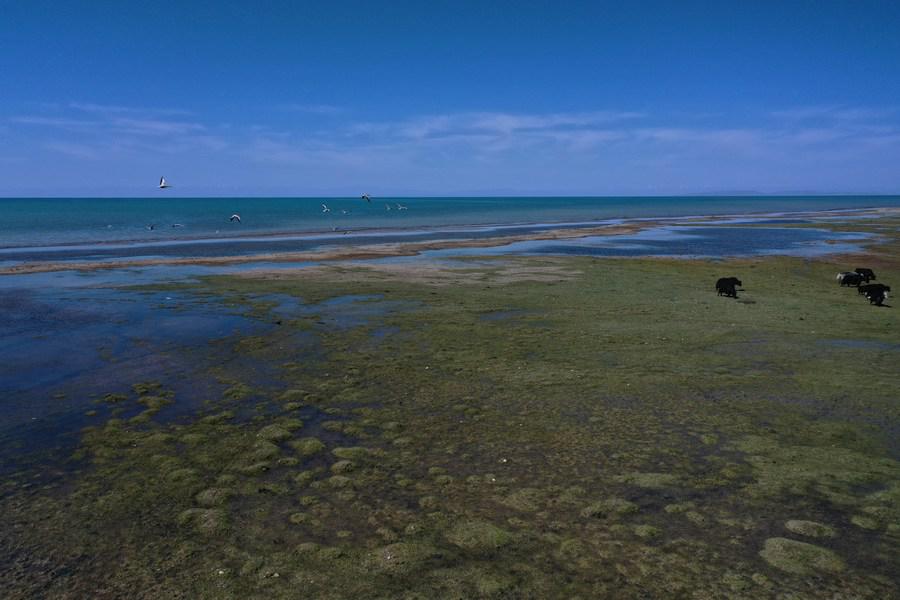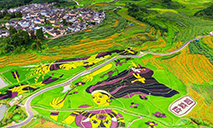Qinghai-Tibet Plateau getting warmer, wetter due to global warming

Aerial photo taken on June 5, 2021 shows a view of a scenic spot of Qinghai Lake in northwest China's Qinghai Province. Located in the northeastern part of the Qinghai-Tibet Plateau, the Qinghai Lake is key to maintaining the ecological balance in western China. (Xinhua/Wu Gang)
BEIJING, Aug. 25 (Xinhua) -- Affected by global warming, China's Qinghai-Tibet Plateau has grown warmer and wetter over recent decades, contributing to the occurrence of extreme weather and climate events, a study has shown.
The plateau has been warming faster than any other region in the country over the past 60 years, according to the findings of the study released on the China Meteorological Administration website on Tuesday.
From 1961 to 2020, temperatures in the region have climbed steadily at a rate of 0.35 degrees Celsius every 10 years, more than twice the global average, while annual precipitation has risen an average of 7.9 mm every 10 years.
Experts have said that the influences of such changes on the region are complicated: While a warmer climate has made the region greener and expanded the habitats of wild animals, extreme weather is more likely to occur in the region.
Due to rising temperatures, extreme climate events and disasters such as blizzards, thunderstorms, landslides and debris flows have increased significantly over the past four decades.
A warmer and wetter plateau could also lead to biodiversity loss, shrinking glaciers and vegetation growth changes in the region, the study has shown.
Climate change is a major factor affecting vegetation growth on the plateau, scientists said, stressing that the increased vegetation in the area over the past 30 years is basically in line with most regions around the world.
Yet the current warming trend has shown no sign of stopping. Experts estimate temperatures will continue to rise, with the region facing greater risks of climate and environmental disasters.
Despite plenty of studies conducted on the plateau, there are still many uncertainties about how a changing plateau will impact the global climate and how different climate systems will interact with each other, experts said.
To restore the plateau's ecosystem and ensure its sustainable development, scientists advised the region to put in place a three-dimensional observation network for climate change, build up data collection and early warning capacities, and conduct deeper research into climate change patterns in the region.
With the highest elevation in the world's mid-latitude region, the Qinghai-Tibet Plateau is highly sensitive to the impact of global warming. The region is known as "the water tower of Asia" as it houses abundant glaciers vital to the regional water cycle and water resources in downstream areas.
Photos
 Dance show saluting traditional culture of the Song Dynasty makes its debut
Dance show saluting traditional culture of the Song Dynasty makes its debut Village in SW China’s Yunnan embraces prosperity through agricultural tourism
Village in SW China’s Yunnan embraces prosperity through agricultural tourism Eighth birthday for pair of giant pandas celebrated in Haikou, Hainan province
Eighth birthday for pair of giant pandas celebrated in Haikou, Hainan province Olympic gold medalists portrayed in Shanxi artist’s polymer clay sculptures
Olympic gold medalists portrayed in Shanxi artist’s polymer clay sculptures
Related Stories
- Political advisors discuss environmental protection on Qinghai-Tibet Plateau
- Shanghai doctor dedicates his life to serving Qinghai-Tibet Plateau
- New potential astronomical observation site identified on Qinghai-Tibet Plateau
- Warming leads to higher precipitation variability: study
- Lower albedo drives glacier melting on Qinghai-Tibet Plateau: study
Copyright © 2021 People's Daily Online. All Rights Reserved.






